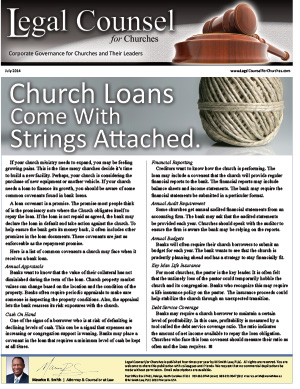If your church ministry needs to expand, you may be feeling growing pains. This is the time many churches decide it’s time to build a new facility. Perhaps, your church is considering the purchase of new equipment or another vehicle. If your church needs a loan to finance its growth, you should be aware of some common covenants found in bank loans.
A loan covenant is a promise. The promise most people think of is the promissory note where the Church obligates itself to repay the loan. If the loan is not repaid as agreed, the bank may declare the loan in default and take action against the church. To help ensure the bank gets its money back, it often includes other promises in the loan documents. These covenants are just as enforceable as the repayment promise.
Here is a list of common covenants a church may face when it receives a bank loan.
Annual Appraisals
Banks want to know that the value of their collateral has not diminished during the term of the loan. Church property market values can change based on the location and the condition of the property. Banks often require periodic appraisals to make sure someone is inspecting the property conditions. Also, the appraisal lets the bank reassess its risk exposures with the church.
Cash On Hand
One of the signs of a borrower who is at risk of defaulting is declining levels of cash. This can be a signal that expenses are increasing or congregation support is waning. Banks may place a covenant in the loan that requires a minimum level of cash be kept at all times.
Financial Reporting
Creditors want to know how the church is performing. The loan may include a covenant that the church will provide regular financial reports to the bank. The financial reports may include balance sheets and income statements. The bank may require the financial statements be submitted in a particular format.
Annual Audit Requirement
Some churches get annual audited financial statements from an accounting firm. The bank may ask that the audited statements be provided each year. Churches should speak with the auditor to ensure the firm is aware the bank may be relying on the reports.
Annual Budgets
Banks will often require their church borrowers to submit an budget for each year. The bank wants to see that the church is prudently planning ahead and has a strategy to stay financially fit.
Key Man Life Insurance
For most churches, the pastor is the key leader. It is often felt that the untimely loss of the pastor could temporarily hobble the church and its congregation. Banks who recognize this may require a life insurance policy on the pastor. The insurance proceeds could help stabilize the church through an unexpected transition.
Debt Service Coverage
Banks may require a church borrower to maintain a certain level of profitability. In this case, profitability is measured by a tool called the debt service coverage ratio. The ratio indicates the amount of net income available to repay the loan obligation. Churches who face this loan covenant should measure their ratio as often and the loan requires.

